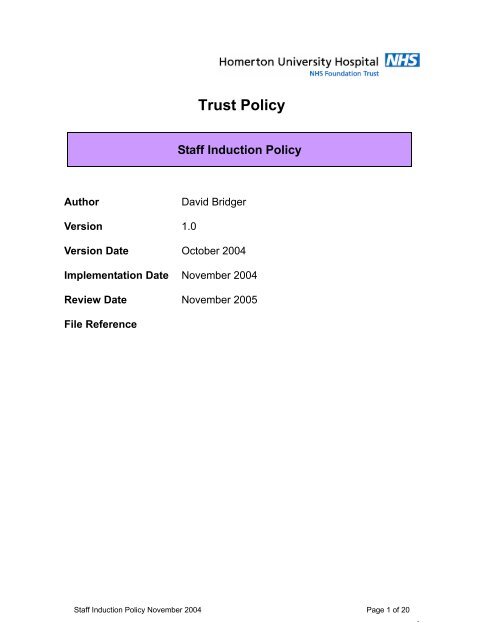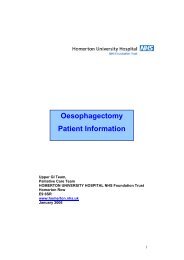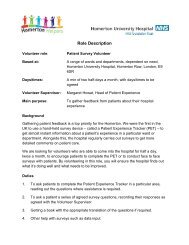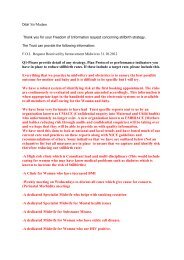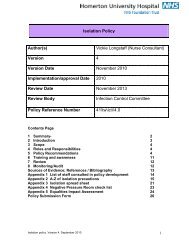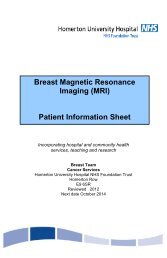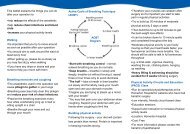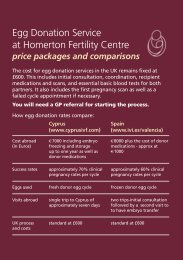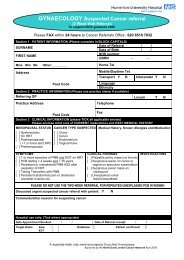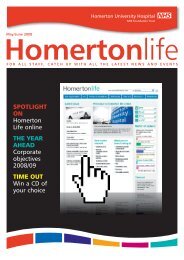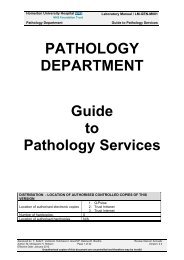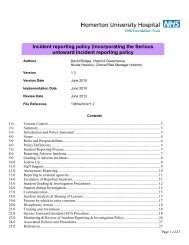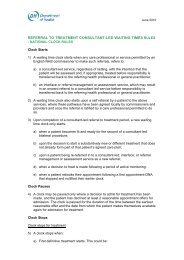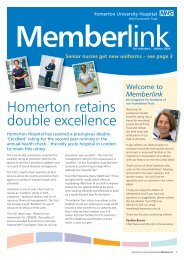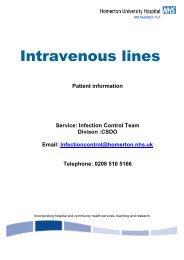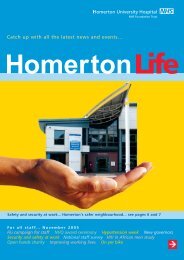Staff Induction Policy - Homerton University Hospital
Staff Induction Policy - Homerton University Hospital
Staff Induction Policy - Homerton University Hospital
Create successful ePaper yourself
Turn your PDF publications into a flip-book with our unique Google optimized e-Paper software.
Trust <strong>Policy</strong><strong>Staff</strong> <strong>Induction</strong> <strong>Policy</strong>AuthorDavid BridgerVersion 1.0Version Date October 2004Implementation Date November 2004Review Date November 2005File Reference<strong>Staff</strong> <strong>Induction</strong> <strong>Policy</strong> November 2004 Page 1 of 20.
1. <strong>Policy</strong> Statement<strong>Homerton</strong> <strong>University</strong> <strong>Hospital</strong> NHS Foundation Trust is committed to providing acomprehensive and effective induction programme at both organisational anddepartmental level, which is designed to enable new staff to function safely andlegally in their new role and to develop a wider understanding of the Trust.2. Introduction<strong>Induction</strong> is the process of welcoming new employees to the Trust and providing informationabout the organisation. The induction period is a crucial link between the recruitment andselection of an individual and their planned development to help enable them become amotivated and competent employee.A well planned, employee-centred induction programme can help to ensure new starters feelwelcome and valued. If the induction process is well delivered, it can have a positive impact onstaff retention rates.The key opportunities induction presents when a member of staff joins are as follows:• Making new staff feel welcome and an integral part of the <strong>Homerton</strong>.• Providing training and information on the legal framework in which the organisationoperates, for example clinical governance, risk and health & safety management, andareas, such as handling complaints, disability and cultural awareness.• Ensuring that new staff have appropriate information in order to perform well in theirrole, within the optimal time period.• Ensuring new staff have the appropriate tools to do the job (IT, accommodation,reference material, etc).• Clarifying expectations regarding the job role through objective setting.• Identifying and planning in order to address development needs.Corporate induction ensures consistency of message and also that mandatory training iscaptured at the beginning of employment.Corporate induction should be complemented by an employee-centred local induction. <strong>Induction</strong>of the new employee into their actual working environment and associated areas should bestructured to meet both safety requirements and individual training and development needs toensure a motivated employee able to provide safe, competent practice in the shortest possibletime.This policy applies to all individuals employed by <strong>Homerton</strong> <strong>University</strong> <strong>Hospital</strong> NHSFoundation Trust regardless of grade or profession.<strong>Staff</strong> <strong>Induction</strong> <strong>Policy</strong> November 2004 Page 2 of 20.
ObjectivesThe objective of this <strong>Policy</strong> is to provide all staff with a guide to the structure, systems andprocedures for induction operated within the Trust. It will also ensure that individuals realise theexpectations the Trust has of them and what they, in turn, can expect from the Trust. <strong>Induction</strong>is divided into two distinct phases Corporate <strong>Induction</strong> and Local <strong>Induction</strong> both of which aremandatory for all staff.Corporate <strong>Induction</strong> is managed and co-ordinated by the Training and DevelopmentDepartment in association with other departments; e.g. Human Resources. It is designed toexplain the culture, requirements and purpose of the Trust, and to address the employees’immediate needs and priorities.It’s aim is to ensure that staff become integrated and productive employees from the earliestopportunity with a working knowledge of their statutory and mandatory responsibilities. Theprogramme is designed to ensure that all mandatory training requirements are covered, e.g.Fire; Health & Safety; Infection Control and Clinical Risk/Governance. Details of the Trust’sCorporate <strong>Induction</strong> Programme can be seen in Appendix 1 or in the current Training andDevelopment brochure.All resuscitation training is provided as per the ‘Cardiopulmonary Resuscitation Training <strong>Policy</strong>’.March 2003.Departmental/Local <strong>Induction</strong> is the responsibility of the Department Manager/Lead Clinicianand must be addressed using a fully documented, formal and structured approach which is inaccordance with this policy. This process should be implemented from day one of employment.To facilitate this all members of staff are issued with an induction checklist, Appendix 2, whichmust completed locally and, once complete, a copy sent to Human Resources.To ensure a consistent approach across specialities, the Trust has set minimum standards forthe local <strong>Induction</strong> for all staff, the programme will incorporate the following content:• Introduction to staff• Orientation to department/wards/clinical areas• Expectations of post• Limitations of role• Familiarisation with equipment and procedures, and appropriate training requirements• Bleep system, resuscitation procedures• Local policies and procedures• Sources of help and adviceDepartmental/local <strong>Induction</strong> also applies to all internal job changes.PrinciplesThe governing principles in respect of induction within the Trust are outlined below and are toensure: -• staff are appropriately trained;• staff are made welcome to the Trust;• all legal and NHS requirements are met (see below);• effective induction/development performance monitoring is regularly undertaken;• the Trust manages and delivers induction effectively.Legislative and NHS requirementsThe leading legislative and NHS requirements supporting the Trust’s aim to achieve bestpractice in respect of induction will be as defined in:-• Risk Management Standards including Clinical Negligence Schemes for Trusts (CNST)and Risk Pooling Schemes for Trusts (RPST)<strong>Staff</strong> <strong>Induction</strong> <strong>Policy</strong> November 2004 Page 3 of 20.
Local <strong>Induction</strong> ProgrammeTo complement the corporate induction programme, local induction should include provision ofadequate and appropriate information to the new employee in accordance with the ‘Local<strong>Induction</strong> Checklist’ document. Please see Appendix 2.It is the responsibility of the line manager to ensure that the new member of staff is adequatelyinducted into the department. The line manager should arrange for either themselves or anothersenior member of staff within the department to meet with the new starter at the beginning oftheir first day of duty. In addition the line manager should arrange to spend time with the newstarter as soon as is practical after the start of employment.An existing member of staff should show the new employee around the department andintroduce them to colleagues and other key staff in the organisation if the manager ornominated deputy is unable to do so. They should be available to act as an advisor over the firstfew weeks to answer any questions that arise.Within the first three months of employment, the line manager should meet with the newappointee to establish their performance objectives, standards to be met, and any trainingneeds that may have been identified during the selection process or subsequent to starting thejob.The new member of staff should have:• completed the local induction checklist• agreed their work objectives with their manager• agreed their personal development plan• become fully familiar with local policies & procedures• become fully familiar with their local surroundings and know where fire exits are andwho the risk officers are• become fully familiar with how to obtain equipment, stationery, etc.• if a budget holder, who their management accountant is and procedures forbudgetary management• had an initial review with their manager at the circa 3 month period to check that allinformation required has been received and to reflect on the induction periodPart Time <strong>Staff</strong>Part time staff are required to attend the Corporate <strong>Induction</strong> course. However, in recognition ofthe operational difficulties this may cause, and the time of the Corporate <strong>Induction</strong> course, staffmay need to attend the Trust <strong>Induction</strong> course outside their normal working hours. In this case,time back will be given or, at the discretion of the manager, payment made.<strong>Staff</strong> <strong>Induction</strong> <strong>Policy</strong> November 2004 Page 5 of 20.
Medical <strong>Staff</strong>Responsibility for this programme rests with the Medical <strong>Staff</strong>ing Department who also maintainrecords of attendance.Corporate <strong>Induction</strong>Pre Registration House Officers (PRHO)Pre-registration House Officers are inducted into the Trust every six months, in August andFebruary.These doctors are required to attend a comprehensive induction programme, consisting of:• One day corporate induction (see agenda Appendix 3)The new doctors are informed about the functions of each hospital department, what they canexpect from hospital support services and what is expected of them as a newly qualified doctor.Each doctor is presented with an information pack, complimenting the training they receive.Doctors are also provided with the Junior Doctors’ Handbook.• One Day shadowing another doctor• In addition to this all PRHO are expected to attend a programme of induction lecturesduring their first month of employment. (see programme Appendix 4) This programmeincludes Clinical Skills training and Resuscitation training.Senior House OfficersSenior House Officers commencing employment with the Trust in August have a one dayinduction focusing upon Trust internal and corporate issues during their first week ofemployment. The programme for this can be seen Appendix 5.Out of Rotation Starters including SHO’s, Middle Grade and <strong>Staff</strong> Grade.For medical staff commencing employment outside of these times, which includes MiddleGrade, <strong>Staff</strong> Grade and Long Term Locum Doctors, the Trust runs a monthly induction sessionspecifically for this group of staff. A copy of the programme can be found at Appendix 6.Career Grade Doctors (e.g. Consultants, Associate Specialists)All new career grade doctors are required to attend the monthly induction session as aboveAppendix 6. They also receive an induction programme to meet with relevant staff within thetrust. Appendix 7.Local <strong>Induction</strong>Pre Registration House Officers (PRHO), Senior House Officers Out of Rotation Startersincluding SHO’s, Middle Grade and <strong>Staff</strong> Grade.The above medical staff are provided with a local specialty based induction and informationbook. Responsibility for this rests with the Consultant in charge.To ensure a consistent approach across specialities, the Trust has set minimum standards forthe Local <strong>Induction</strong> of medical staff in training, the programme should incorporate the followingcontent:• Introduction to staff• Orientation to wards/clinical areas• Expectations of post• Limitations of role• Familiarisation with equipment and procedures, and appropriate training requirements• Bleep system, resuscitation procedures<strong>Staff</strong> <strong>Induction</strong> <strong>Policy</strong> November 2004 Page 6 of 20.
• Local policies and procedures• Sources of help and advice• Mentorship• Minimum period of supervised practiceTemporary (locum, bank or agency) <strong>Staff</strong>This applies to ALL staff temporarily employed by <strong>Homerton</strong> <strong>University</strong> <strong>Hospital</strong> NHSFoundation Trust. The aim of induction for this group of staff is to ensure that they are suitablyinformed and competent to perform the duties of their post.<strong>Staff</strong> Bank (nurses and midwifes)<strong>Staff</strong> employed by the <strong>Homerton</strong> <strong>Staff</strong> Bank who are existing staff will have followed the trustscorporate and local induction procedures. <strong>Staff</strong> employed solely by the bank are booked on theTrusts Corporate <strong>Induction</strong> by <strong>Staff</strong> Bank.Agency/Locum <strong>Staff</strong> (Non-medical)All agency/locum staff will be provided with an induction to the area in which they are workingwith reference to the wider trust. To facilitate this a checklist is provided in all departmentsdetailing the minimum requirements for information to be given to the temporary or agency staff.This information includes basic details of the chain of command and the location of keydepartments, communication systems and resuscitation arrangements, together with cleardetail covering:• What the job is• Who the supervisor is• What the duties and responsibilities are• Bleep arrangements• Relevant procedures and protocols including incident reporting.• Information on where to seek clinical helpFor all temporary staff there needs to be a personal handover by the regular post holder or amore senior person who will explain the basic requirements of the job.Locum Medical <strong>Staff</strong>Locum Medical <strong>Staff</strong> employed by the Trust should be given a copy of the locum handbookupon appointment. Out of hours this is obtained from switchboard.Procedure for Rectifying Non-Attendance on Mandatory and Statutory Courses<strong>Staff</strong> administering attendance of staff on mandatory and statutory courses are required toensure that all staff who have a confirmed place on these courses sign their attendance on the‘Attendance Register’ on arrival at the course.Where a delegate fails to attend without providing due cause for the non-attendance, the courseadministrator shall send an appropriate letter of ‘non-attendance’, to the delegate’s linemanager informing him/her of the non-attendance and specifying what action will proceed. Formandatory/statutory courses this action generally means the non-attendee will be offered aplace on the next available course.The Trust expects line managers, as far as it is practical in relation to the needs of the service,to facilitate the release of such staff to attend the course next offered. Line managers are alsorequired to discuss reasons for non-attendance with the delegate involved and stress theimportance of attending such courses.The Training Department will regularly distribute to senior directorate managers attendancedetails of staff that have attended mandatory/statutory training courses. It is expected thisinformation will be disseminated at quarterly intervals.<strong>Staff</strong> <strong>Induction</strong> <strong>Policy</strong> November 2004 Page 7 of 20.
The Trust will be monitoring attendance at induction courses and the information will be passedto relevant committees and groups in the Trust e.g. Risk Committee and Learning Board.Evaluation & ReviewThis policy will be continually monitored and will also be the subject of a regular review whichwill take place one year from the date of issue and at two yearly intervals thereafter. An earlierreview may be warranted if one or more of the following occurs;• following feedback from training;• regulatory/statutory changes or developments;• results/effects of critical incidents;• any other relevant or compelling reason.Audit Arrangements. The Training and Development Department will audit inductionprogrammes and training and development records detailed in this <strong>Policy</strong> at regular intervals orat least on a six monthly basis. The results of departmental audits will then be presented to theLearning Board.<strong>Staff</strong> <strong>Induction</strong> <strong>Policy</strong> November 2004 Page 8 of 20.
Appendix 1: Corporate inductionThe Trust Corporate <strong>Induction</strong> Course comprises of five half-day modules all of which aremandatory:Welcome To The <strong>Homerton</strong>The ‘Welcome to the <strong>Homerton</strong>’ morning welcomes all new staff members and gives them anintroduction to the structure of the Trust and how it works within the NHS, plus information andtimetables for the rest of their Corporate <strong>Induction</strong>.It provides staff with a wealth of information essential to working here, as well as being usefulon a personal level. It also offers the opportunity to meet and ask questions of a number of keypeople across the trust, and gain knowledge of the current issues facing us. <strong>Staff</strong> completingthis module will gain:• An opportunity to meet key staff (including Trust Directors) and ask questions• An understanding of the Trust structure• An introduction to current initiatives within the Trust• An outline of support services and benefits available to staffInformation on the role of <strong>Staff</strong> side (Union Representation)Lifelong LearningThe Lifelong Learning module presents concepts of approaches to learning and CPPD; andexplains how we learn differently as individuals, as well as an introduction to the Trust’sAppraisal system, PDPs and KSFThe <strong>Homerton</strong> offers a wealth of opportunity to expand staff horizons and fulfill potential,backed by a commitment to lifelong learning, whatever the staff member’s level and situation.This module deals with how to take best advantage of the educational & developmentalactivities on offer, and achieve personal and professional goals. <strong>Staff</strong> who complete this modulewill be able to:• Identify how they contribute to Trust goals• Understand the principles of the Trust Appraisal System• Understand the importance of a Personal Development Plan• Reflect on personal approaches to learning and which best suits you• Access the development opportunities available• Establish priorities for Personal & Professional DevelopmentHandling ComplaintsThe focus of the National and Trust procedures for handling complaints rests on front line staffdealing with complaints as they arise, whenever possible, or finding someone who can. Thismodule is designed to equip staff with the necessary skills and knowledge to deal with patientcomplaints and feedback in a sensitive but effective manner.• Identify why patients/carers complain• Use the complaints procedure in dealing with complaints• Respond appropriately to complaints as they are raised• Demonstrate effective skills in dealing with difficult situations• Identify the link between complaints and improving patient careUnderstand the role of PALS<strong>Staff</strong> <strong>Induction</strong> <strong>Policy</strong> November 2004 Page 9 of 20.
Working With DiversityThis course is designed to provide all staff with a forum to develop their awareness andknowledge of diversity issues in a healthcare setting. This will cover sensitive issues aroundproviding equitable and appropriate services to all members of the community, as well asenhancing team understanding and communication at work.• Understanding of the diversity within Hackney• An understanding of different values and belief systems• A chance to explore factors behind an individual's outlook and behaviour• Awareness, via discussion, of issues of religious and cultural difference• An understanding of prejudice and discrimination and how to avoid it• An awareness of resources available for further informationRisk ManagementThis session, for both clinical and non-clinical staff, provides statutory annual fire training andan insight into Risk Management Strategies. The session covers:• Provision of statutory annual fire lecture• Update for staff on current Health and Safety/ Risk Management Information• Clinical Risk Management• Security/Personal Safety.<strong>Staff</strong> <strong>Induction</strong> <strong>Policy</strong> November 2004 Page 10 of 20.
Appendix 2 HOMERTON UNIVERSITY HOSPITAL INDUCTION CHECKLISTFOR NEW POSTHOLDERS AND INTERNAL JOB CHANGESNAME:…………………………………………………..DIRECTORATE:……………………………JOB TITLE:………………………………………….. DEPT/WARD..……………………………..START DATE: ………………………………………. MANAGER:……..…………………………Both Post holder & Manager are required to sign next to each item once they aresatisfied it has been covered during the induction process.(* denotes if applicable.)PREPARATION –To be completed on first working dayOccupational Health appointment attendedSigned onto payroll with Human Resources*Computer & Desk Space*Computer & Email Username*PAS passwordSwitchboard informed of name & extensionINITIAL ORIENTATION -To be completed by end of firstworking dayIntroduction(Welcome, accommodation, colleagues, toilets,refreshements,lunch, breaks)Tour of DepartmentSecurity & Safety arrangementsFire DrillAccident ReportingAbsence & Sickness ReportingInformed of data Protection ActClarification of Carer CommitmentsID badge application completedInformed of photo session for ID badge*Swipe CardTHE DEPARTMENT / WARD -To be completed between the first day and end ofone working monthHealth & Safety: *manual handlingDepartment role and organisationTeam ObjectivesQuality StandardsDepartment/<strong>Staff</strong> MeetingsHours of WorkAnnual LeaveTelephone & Bleep SystemEquipment / MachineryIT SystemsResources e.g. stationeryGratuities*Basic Complaints proceduresPolicies & Procedures:*ordering/standing/financial instructionsTHE JOBTo be completed by the end of the first monthJob descriptionPOSTHOLDER’SSIGNATUREPOSTHOLDER’SSIGNATUREMANAGER’SSIGNATUREMANAGER’SSIGNATURE<strong>Staff</strong> <strong>Induction</strong> <strong>Policy</strong> November 2004 Page 11 of 20.
Role ClarifiedKey ContactIntroductions ScheduleKey Meetings*<strong>Staff</strong> Management Responsibilities*Professional Registration*Uniform/Protective ClothingTHE HOMERTON UNIVERSITY HOSPITAL NHSTRUST -To be completed between first day and end of firstworking month.This information is available on ‘Welcome to the<strong>Homerton</strong>’ <strong>Induction</strong> ModuleOrganisationServicesPatients/clientsDevelopmentsSummary Annual Plan<strong>Induction</strong> Training Modules‘WORKING TOGETHER’All employees should be clear of the focus of their job and have either performance objectivesor standards agreed within their first three months.(<strong>Staff</strong> on Preceptorship Programmes are expected to do this after six months).All staff will then need to fit into the Trust Cycle for appraisal as appropriate.Performance Objectives/Standardsagreed on:(date)________________________________Six Month Review planned for:(date)________________________________Criminal Records Bureau Form Received and Recordedby: (HR) ……………………………………………….Manager:………………………………………………………………..Individual Learning Plan identified:Includes:Received dates for all four induction modulesOther Statutory Mandatory Training:(i.e:)________________________________*Received Key Skills TrainingLine Manager’s Signature........................................... Date .....................Job Holder’s Signature ............................................. Date .....................RETURN TO HUMAN RESOURCES ON COMPLETION OF INDUCTIONPlease keep a copy for your own reference if you wish to do so<strong>Staff</strong> <strong>Induction</strong> <strong>Policy</strong> November 2004 Page 12 of 20.
Appendix 3: House Officer <strong>Induction</strong>HOMERTON UNIVERSITY HOSPITAL NHS FOUNDATIONTRUSTHOUSE OFFICER INDUCTION8.00amSign in - BreakfastID Badges – Jim Woodford8.30am Security - Car Parking / Safety / Fire / Emergencies – JimWoodford/LesGreen9.00am9.15am9.45amWelcome to the <strong>Homerton</strong> - Pauline Brown, Director of CorporateDevelopment and HRClinical Tutor – Helen CugnoniHelp and Where to get it – Clinical Site Manager10.00am Critical Care Outreach Team –10.15am10.30am10.45am11.00am11.15am12.45pm1.30pm5.00pmInfection Control - Consultant MicrobiologistRisk Management and Clinical Governance – Gail HamillCurrent House Officers Talk – Mathi Rasanesan and Kate SherrattJunior Doctors Liaison Manager – Sam HutchingsPAS or Tour/Accommodation and Library Stalls/Sign-on with Medical<strong>Staff</strong>ingLunchEPR TrainingEnd of Day<strong>Staff</strong> <strong>Induction</strong> <strong>Policy</strong> November 2004 Page 13 of 20.
Appendix 4: House Officer One Month Lecture ProgrammeHOUSE OFFICER INDUCTION LECTURES12.30 pm - 2.30 pm, Education Centre (please check board for roombooking)Date Lecture Title LecturerWednesday 11.00-12.301.00-2.30CPR Training, Group 1CPR Training, Group 2Debbie WallisDebbie WallisThursday 12.30-1.30 Discharge Planning/Social Jackie Kincaid/ Jackie MurdochServicesTuesday 11.00-12.30 CPR Training, Group 3 Debbie WallisWednesday 12.30-1.30 Radiology Dr Kamini PatelThursday 12.30-1.30 Pharmacy/PrescribingErrorsThursday 12.30-1.00 Phlebotomy1.00-1.30 Clinical ChemistryFriday 12.30-1.00 Haematology & Blood1.00-1.30 GroupsHIV testing for patientsIola Williams/ Maddy WoodsHannah HallDr Peter TimmsDr Roger AmosPeter HorneWednesday 12.30-1.30 Therapies Anne Bisset-SmithThursday 12.30-1.30 Acute Pain Maddy WoodsWednesday 12.30-1.30 EWTD Vicky MonaghanThursday 12.30-1.30 Breaking Bad News Rev Nadia PfaffThursday 12.30-1.30 Medical Record Keeping Dr Mary BrittonThursday 12.30-1.30 ECGs & Chest Pain Dr Arshad, SpR in Cardiology<strong>Staff</strong> <strong>Induction</strong> <strong>Policy</strong> November 2004 Page 14 of 20.
Appendix 5: SHO <strong>Induction</strong> ProgrammeHOMERTON UNIVERSITY HOSPITAL NHS FOUNDATIONTRUSTSENIOR HOUSE OFFICER INDUCTION8.00amSign in - BreakfastID Badges – Jim Woodford8.30am Risk Management – Security / Car Parking / Safety / Fire /Emergencies -Woodford/LesGreenJim9.00amof9.30am9.45am10.15am10.30am10.45am11.00am11.15am12.45pm1.30pm5.00pmWelcome to the <strong>Homerton</strong> and Clinical Tutor - Pauline Brown, DirectorCorporate Development and HR and Helen CugnoniHelp and Where to get it – Clinical Site ManagerThe Sick Patient and Critical Care Outreach Team – Robert Ghosh andDoug LothianInfection Control – Vickie LongstaffClinical Governance – Gail HamillPharmacy – Prescribing – Iola WilliamsJunior Doctors Liaison Manager – Sam HutchingsPAS or Tour/Accommodation and Library Stalls/Sign-on with Medical<strong>Staff</strong>ingLunchEPR TrainingEnd of Day<strong>Staff</strong> <strong>Induction</strong> <strong>Policy</strong> November 2004 Page 15 of 20.
Appendix 6HOMERTON UNIVERSITY HOSPITAL NHS FOUNDATIONTRUSTSPECIALIST REGISTRAR/ MIDDLE GRADE INDUCTIONEducation Centre9.00amBreakfastID BadgesJim Woodford/Les Green x7754Security - Car Parking/ Safety Head of SecurityFire/ EmergenciesIncident Reporting9.20am Welcome to the <strong>Homerton</strong> Dr John Coakley x7320Philosophy of the <strong>Hospital</strong>Medical Director<strong>Hospital</strong> at NightOr representative9.40am Clinical Site Managers & Clinical Site Manager Bp 118Critical Care Outreach Team Doug Lothian Bp 1799.50am Infection Control Infection Control Nurse x755710.10am Clinical Governance Gail Hamill x771810.30am Junior Doctors Liaison Manager Sam Hutchings x7744Rotas/ Leave/ Basic info10.45amJoin Departments for Formal Departmental <strong>Induction</strong><strong>Staff</strong> <strong>Induction</strong> <strong>Policy</strong> November 2004 Page 16 of 20.
Appendix 7: HOMERTON UNIVERSITY HOSPITAL NHS FOUNDATION TRUSTCONSULTANT INDUCTIONStart Date -Dates available:DrConsultantTime Person VenueNancy Hallett, Chief ExecutiveJohn Coakley, Medical DirectorClinical DirectorGeneral ManagerPauline Brown, Director of CorporateDevelopmentSenior NurseIain Patterson, Associate Director of HumanResourcesSam Eaton, Clinical Governance TeamDuriye Eeidas, Advocacy Coordinator 7931Vicky Monaghan, Medical <strong>Staff</strong>ingClinical Support/PharmacyLead ConsultantAnne Marie Karcher & Bruce Macrae,Consultant MicrobiologistsGina Rodway, Clinical CodingLibrary <strong>Staff</strong>, Newcombe LibraryBunia Gorelick, Research Co-ordinatorHelen Cugnoni, Clinical TutorOccupational HealthDirector of NursingMonday Lunchtimes12.40 - 1.30Thursday Mornings10.30 – 11.303rd Tues of month12.30Postgraduate MeetingsLecture Theatre, Buffet lunchprovided from 12.15ID BadgeSmall Blue Common RoomEducation CentreMedical Council Conference Room 1Education Centre<strong>Staff</strong> <strong>Induction</strong> <strong>Policy</strong> November 2004 Page 17 of 20.
<strong>Policy</strong> TitleLead“home”DirectorateInformedDocument Progress SheetThis form to be completed by the Lead Clinician at all relevant stages<strong>Staff</strong> <strong>Induction</strong> <strong>Policy</strong>David BridgerDevelopment of guidelines approved by “home” Directorate or Expert Group MinutesattachedDate ___________________Minutes attached yes / no Registeredvia ClinicalGovernanceFacilitatorName: ___N/A________________Date: _____________________Versionnumber__1.0___circulatedVersionnumber_1.0___circulatedFinal Versionnumber__1.0___approved byExpertCommitteeORFinal version_____approved byhomedirectorateAttach a complete list of those on circulation list All members of learning board.Date: ______01/11/2004_______________Other Directorate or Expert Groups Surgery, Anaesthesia and ITU Medicine & Rehab Children, Women & Sexual Health Diagnostic & Emergency Services Nursing & Quality ELCMHT CHTPCT Other Please specifyExpert Group or Trust CommitteeGroup Name ___Learning BoardInitial: _____________________Initial: _____________________Initial: _____________________Initial: _____________________Initial: _____________________Initial: _____________________Initial: _____________________Initial: ____Learning Board/HRDate ___________________ Are Minutes attached no NB: Clinical Board will not accept any CPG with out minutes verifying “expert”committee approvalFinal version of guidelines approved by “home” DirectorateGroup Name ________N/A___________________Date ___________________ Are Minutes attached yes / no NB: Clinical Board will not accept any CPG with out minutes verifying directorateapprovalSubmitted to Clinical Board on: __________10/11/2004___________by: _______David Bridger_____________<strong>Staff</strong> <strong>Induction</strong> <strong>Policy</strong> November 2004 Page 18 of 20.
Document TitleAuthor (s) and Grade (s)DepartmentDocument Control Summary<strong>Staff</strong> <strong>Induction</strong> <strong>Policy</strong>David BridgerHuman ResourcesDate of Production November 2004Planned implementationdate:Purpose/Aim ofDocumentCirculated toNovember 2004<strong>Policy</strong> for the induction of all Trust staff.Learning BoardStatusVersion Reference V1.0File Reference / Address(Trust network/Intranet)Update FrequencyAnnuallyNext Review Date November 2005Approved ByLearning BoardSignaturesLearning Board Chair: __________________________Clinical Board Chair: _____________________<strong>Staff</strong> <strong>Induction</strong> <strong>Policy</strong> November 2004 Page 19 of 20.
<strong>Staff</strong> <strong>Induction</strong> <strong>Policy</strong> November 2004 Page 20 of 20.


